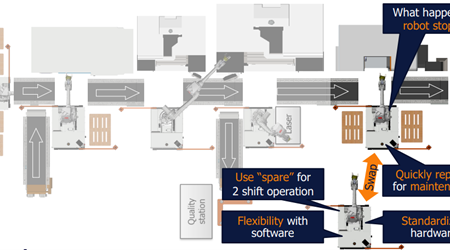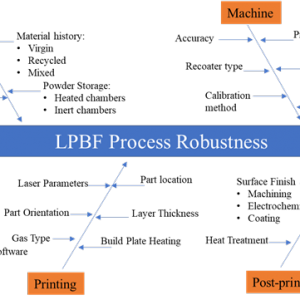Anna Syberfeldt
Professor in Production Engineering


Project time: 2021 – 2024
Budget: 6 000 000 kr
The project aims to develop a new cyber-physical framework to realize extremely flexible production.
In order for manufacturing companies to remain competitive, resilient and sustainable in an ever-changing world, extreme flexibility in the production processes is required. Within the project, an extremely flexible production is defined as a highly modular and interconnected cyberphysical system, based on a system-by-system concept. Such a system can be quickly modified, and the fact is that constant change is seen as part of the normal operation of an ultra-flexible system. This results in the ability to move equipment around to support new or alternative production processes, reconfiguring equipment in real time as a response to production disruptions. At the same time, it is ensured that changes result in a system-cyber-physical configuration that is optimal from a sustainability perspective. The core of the framework is based on the popular concept of digital twins, which are virtual dynamic representations of physical production resources and subsystems. With the digital twins, the flexibility of the production system can be maximized efficiently both in conceptual stages and in operation. From a technical perspective, the purpose of the framework is to enable seamless integration between, and implementation of, digital twins in production – a concept we call the cyberphysical continuum. By realizing a cyberphysical continuum, the project will play a significant role in the cyberphysical transformation of the Swedish manufacturing industry and enable extremely flexible production that improves competitiveness, resilience and sustainability.
The aim of the project is to demonstrate utilization of additive manufacturing for copper-based products and process solutions and faster adaption
2016 – 2018

The main idea of the project is to investigate and demonstrate how the digitalized and proven systems and technologies of the Process Industry, like CPAS, can be used in DM to improve competitiveness and drive growth
2017 – 2019
2013 – 2016

2016 – 2018
Reduced lead times and improved performance for tooling through innovative manufacturing and assembly strategies as well as optimised design enabled by use of additive manufacturing (AM).
2016 – 2018
2014 – 2016
2014 – 2017
Robotic solutions with autonomous decision-making software supporting on-demand production using resource pools.
2021 – 2024
This project aims to contribute to the development of future ERP-systems. The project will explore how to offer work, redefine work roles and challenge companies to make use of advanced systems support and the technology within and around these. Overall, the project aims to contribute to the development of both the next generation of ERP-systems and a complementary change in the way firms see upon work organization, so that technology can support and meet the needs of the humans within organisations rather than enforcing structures upon them.
2019 – 2019
Assessing the Robustness of the Laser Powder Bed Fusion Process
2021 – 2024
